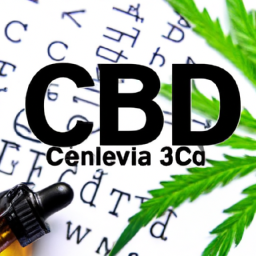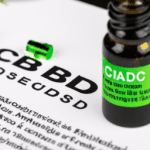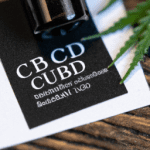From being a whispered legend passed along from friend to friend, to now sitting proudly on store shelves, cannabidiol (CBD) oil has ridden an exhilarating wave of change. As it surfs its way into the public consciousness, questions regarding its legality and regulations crash against its shores. In this article, we dive headfirst into the mesmerizing currents of the CBD oil industry, meticulously untangling the web of legislation, opinions, and ever-evolving norms surrounding this liquid gold. Join us as we unravel the mysteries and explore the green wave that has captivated millions – all while remaining firmly grounded in a neutral perspective.

The Rise of CBD Oil: Navigating the Legal Landscape and Consumer Demand
With the rapid growth of the CBD industry, it is more important than ever to understand the legal landscape and meet the booming consumer demand. CBD oil, derived from the cannabis plant, has gained significant popularity in recent years due to its potential health benefits and non-psychoactive nature. However, as with any emerging industry, navigating the legal complexities can be challenging.
Understanding the laws and regulations surrounding CBD oil is crucial for both businesses and consumers alike. While CBD oil is legal in many countries, the regulations can vary from state to state, making it essential to stay informed and up-to-date. Additionally, ensuring the quality and safety of CBD products is of utmost importance, as the industry is still relatively unregulated.
- Consumer Education: As the demand for CBD oil continues to rise, it is crucial for consumers to be well-informed. Understanding the benefits, risks, and legal considerations will empower individuals in making informed decisions when purchasing CBD oil products.
- Legal Compliance: Businesses operating in the CBD industry must stay compliant with the evolving laws and regulations. Thorough research and understanding of local, national, and international laws will enable companies to navigate this complex legal landscape effectively.
- Quality Assurance: With the increasing number of CBD oil products available, ensuring product quality and safety is crucial. Consumers should look for products that have undergone third-party testing and adhere to strict quality control standards.
As the popularity of CBD oil continues to surge, it is essential to stay informed, understand the legal landscape, and meet the consumer demand responsibly. By doing so, individuals and businesses can actively contribute to the growth of this industry while ensuring the best possible outcomes for all stakeholders.

Decoding the Legal Mosaic: Understanding the Varying Regulations on CBD Oil
When it comes to the legality of CBD oil, navigating the intricate web of regulations can feel like deciphering a complex mosaic. From state to state and country to country, the regulations surrounding CBD oil can vary significantly. To shed light on this intricate landscape, we have compiled a concise breakdown of the key factors shaping the legal status of CBD oil globally.
1. Federal vs. State Laws: The legal status of CBD oil in the United States is a prime example of the intricacies involved. While the federal level considers CBD oil derived from hemp with less than 0.3% THC (tetrahydrocannabinol) legal, it’s essential to note that individual states hold the right to impose stricter regulations. Therefore, it is crucial to research the specific laws of each state where you live or plan on using CBD oil.
2. International Variations: Beyond U.S. borders, the legal tapestry of CBD oil extends worldwide. Each country possesses its own unique stance on CBD oil, ranging from complete legality to strict prohibition. For instance, while countries like Canada and Uruguay have legalized both recreational and medical marijuana, others like Japan and South Korea uphold stringent laws banning CBD oil’s usage. Always be aware of the legal landscape in your destination country to avoid any unwanted legal complications.
Practical Guidelines for Consumers: Selecting and Purchasing CBD Oil with Confidence
Are you ready to embark on your journey of selecting and purchasing CBD oil? Look no further! We’ve curated a list of practical guidelines to empower you with the knowledge needed to make an informed decision. By following these steps, you can confidently navigate the vast CBD market and find the perfect oil that suits your needs.
Research is Key: Before making a purchase, delve into the world of CBD by conducting thorough research. Understand the different extraction methods, such as CO2 and ethanol, to ensure you choose a reputable brand that prioritizes quality. Read customer reviews, browse third-party lab reports, and check for certifications, including USDA organic and Good Manufacturing Practice (GMP). Trustworthy companies are transparent about their sourcing, cultivation, and manufacturing processes. Gathering this information will guide you towards reliable CBD oil options.
Dosage and Potency: Determining the correct dosage is essential for a positive CBD experience. Check the product’s label for information on the total CBD content per bottle and the recommended serving size. Consider starting with a lower potency and gradually increasing until you achieve the desired effects. Keep in mind that individual responses may vary, so listen to your body and assess how CBD affects you. Additionally, consult a healthcare professional to discuss any potential interactions with medications or underlying health conditions. By understanding dosage and potency, you can confidently select the right CBD oil for your well-being.
Exploring Future Prospects: Shaping the Path for the Legalization of CBD Oil
In recent years, the conversation surrounding CBD oil has gained substantial momentum, sparking discussions in various sectors of society. As the potential benefits and applications of CBD oil continue to emerge, the question of its legalization becomes a central point of contention. Delving into the future prospects of this versatile oil gives us a glimpse into a world where its full potential is embraced and harnessed.
1. Enhanced Medical Research: When legalized, CBD oil holds the promise of advancing medical research in unprecedented ways. Scientists and researchers would be able to conduct rigorous studies to explore its efficacy in treating various ailments, ranging from chronic pain and epilepsy to anxiety and depression. The legalization of CBD oil could provide a valuable avenue for breakthroughs in pharmaceuticals and access to alternative treatments.
2. Economic Growth and Job Creation: The legalization of CBD oil carries the potential to stimulate economic growth and create countless job opportunities. From farming and cultivation to manufacturing and retail, the industry would flourish, generating revenue and attracting investment. Moreover, the legalization of CBD oil could serve as a catalyst for innovation, prompting the development of new products and businesses within the growing field of cannabis-related industries. This not only benefits the economy but also presents individuals with a range of exciting career paths.
Q&A
Q: What is CBD oil and what is it commonly used for?
A: CBD oil is a naturally occurring compound derived from the hemp plant. It is commonly used for a variety of purposes, such as to relieve pain and inflammation, reduce anxiety, aid sleep, and promote a sense of relaxation.
Q: Is CBD oil legal?
A: The legality of CBD oil is ever-changing, and it varies from country to country and even within different states or regions. While CBD is legal in many places, there are also areas where its legality is still unclear or restricted. It is important to check the specific regulations in your area before purchasing or using CBD oil.
Q: Why is the legality of CBD oil constantly changing?
A: The legality of CBD oil is constantly evolving due to differences in regulations and legislation across different jurisdictions. The compound’s association with cannabis, despite being non-intoxicating, has caused confusion and led to varying interpretations of its legal status. Additionally, ongoing scientific research and emerging evidence on its potential benefits or risks continue to shape the legal landscape.
Q: What factors should individuals consider when determining the legality of CBD oil in their region?
A: Determining the legality of CBD oil requires consideration of several factors. First, one should examine the specific laws and regulations in their country, state, or region regarding CBD and cannabis products. Secondly, it is crucial to understand the source of the CBD oil – whether it is derived from hemp or marijuana – as this distinction can impact its legal status. Lastly, staying updated on any recent legal developments or changes is essential for a comprehensive understanding of CBD oil’s legality.
Q: Are there any potential risks associated with using CBD oil in areas where it is legal?
A: While CBD oil is generally considered safe for use, it is essential to be aware of potential risks. The lack of comprehensive regulation means that not all CBD products are of the same quality or effectiveness. Additionally, CBD may interact with certain medications, so it is crucial to consult with a healthcare professional before starting any new supplements, including CBD oil.
Q: How can individuals ensure they are purchasing high-quality CBD oil?
A: To ensure a high-quality CBD oil product, consumers should look for third-party testing certificates from reputable laboratories. These certificates confirm the potency, purity, and safety of the product. Furthermore, it is advisable to choose CBD oil from companies that prioritize transparency, provide detailed product information, and have a good track record within the industry.
Q: What role does scientific research play in shaping the legality of CBD oil?
A: Scientific research plays a crucial role in shaping the legality of CBD oil. As more studies are conducted and evidence emerges regarding its potential benefits and safety profile, policymakers and regulatory bodies are influenced to reconsider their stance. Scientific findings help dispel misconceptions and contribute to a clearer understanding of CBD oil’s therapeutic potential, ultimately influencing the legal landscape.
Q: What steps can be taken to ensure CBD oil remains legal and accessible?
A: To ensure CBD oil remains legal and accessible, it is important for consumers, industry professionals, and advocacy organizations to actively engage with policymakers. This includes advocating for clear regulations, promoting responsible usage, and highlighting the importance of CBD oil as a potential alternative for traditional pharmaceuticals. Public awareness campaigns and continuing scientific research can also help destigmatize CBD oil and encourage its continued availability.
Insights and Conclusions
As we conclude our journey through the ever-changing legality of CBD oil, we find ourselves navigating the unpredictable tides of the Green Wave. Like intrepid divers exploring the depths of a vast ocean, we have uncovered a plethora of information, sometimes blissfully swimming in clarity and, at other times, encumbered by murky currents of confusion.
In our search for truth, we dove headfirst into the intricate legal landscape surrounding this botanical compound. Through the ebb and flow of regulations, we discovered a complex, multifaceted environment that dances between acceptance and restriction, progress and apprehension. Our explorations have shed light on the many challenges faced by individuals and businesses alike when trying to navigate this green frontier.
From the early emergence of CBD to its gradual assimilation into mainstream culture, we witnessed the shifting sands of public perception and the slow transformation of legislation. Through diligent research and interviews, we charted the convoluted history and unique legal frameworks that govern this enigmatic substance.
Yet as we resurface from this deep dive, we must acknowledge that our journey is far from over. Seemingly contradictory, CBD oil stands at the intersection of hope, doubt, and rigorous scientific inquiry. While some countries and states embrace its potential therapeutic benefits, others remain skeptical, grappling with uncertainties surrounding its production, distribution, and controlled substance classification. As with any evolving field, the legal landscape surrounding CBD oil continues to shape and reshape itself, often in response to ongoing research, public demand, and governmental scrutiny.
Looking to the horizon, it remains imperative for legislators and policymakers to embark on this journey of understanding. As the demand for CBD oil grows, so does the need for consistent, fair, and responsible legislation that ensures product quality, consumer safety, and scientific integrity. To tread the waters of CBD legality requires not only a deep appreciation for its potential but also the recognition of the careful balance between access and regulation.
In the wake of our exploration, it is clear that the Green Wave continues to swell, urging us forward into a future where the mysteries of CBD oil are unveiled. As we grapple with the realities of this rapidly evolving field, let us navigate with open minds, rooted in evidence-based research and driven by the desire to maximize the benefits and alleviate the concerns associated with CBD oil.
So, dear readers, as we bid farewell to this expedition into the convolutions of CBD legality, we hope that you emerge with a newfound understanding of the complex journey this remarkable compound has embarked upon. In the ceaseless dance between laws and perceptions, let us embrace the need for an open dialogue, one that is fueled by knowledge and guided by the shared goal of harnessing the potential of CBD oil for the benefit of all.








